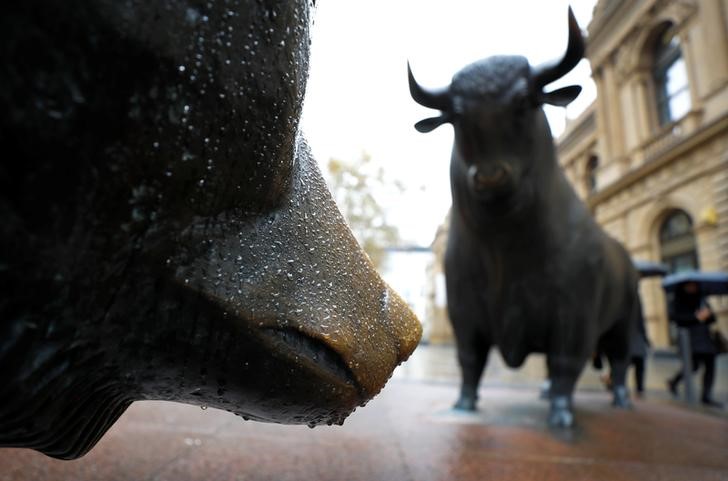This post was originally published on this site

Investing.com – European stock markets are expected to trade in a mixed fashion at the open Monday, at the start of a week that includes important inflation data, a policy-setting meeting by the Bank of Japan as well as the return of the World Economic Forum to Davos.
At 02:00 ET (07:00 GMT), the DAX futures contract in Germany traded 0.2% lower, the FTSE 100 futures contract in the U.K. fell 0.1%, while CAC 40 futures in France climbed 0.2%.
Trading volumes are likely to be lighter in Europe Monday, with the U.S. stock market closed for the Martin Luther King Jr. Day holiday.
Economic data released earlier Monday showed German wholesale prices fell 1.6% on the month in December, a welcome retreat. That said, the early focus this week is likely to be on the release of Germany’s ZEW survey of economic sentiment for January on Tuesday.
This is expected to show an improvement to -15.5 from -23.3 in December, and European equities have benefited from this boosted sentiment, with both the DAX and the CAC 40 over 8% higher so far this year.
This has largely been as a result of signs that inflation is on the retreat, allowing central banks to ease back from their aggressive monetary tightening.
Data late last week showed that U.S. consumer prices fell for the first time in over two-and-a-half years in December, and investors will focus on a final reading of Eurozone inflation for December later this week, as well as one from Britain, for confirmation that the worst of the global price squeeze is over.
The Bank of Japan has been the major outlier, largely maintaining its very accommodative monetary stance even as its main peers tightened interest rates drastically.
However, this may be changing after the BOJ stunned markets last month by widening the band around its 10-year bond yield target, a move that investors saw as a prelude to a future rate hike.
This places Wednesday’s policy-setting meeting firmly in focus amid speculation that it could make further adjustments to its yield curve control policy, the first stage of phasing out its massive stimulus.
The World Economic Forum returns to the Swiss ski resort of Davos this week, with European Central Bank President Christine Lagarde and German Chancellor Olaf Scholz among the dignitaries expected to attend the glitzy affair after a pandemic-influenced three year absence.
Oil prices fell Monday, handing back some of last week’s strong gains at the start of a week that includes a plethora of economic data as well as demand forecasts from OPEC and the IEA.
The Organization of Petroleum Exporting Countries releases its latest analysis on Tuesday, followed by the International Energy Agency the following day. Traders will be looking to see what the agencies say about China’s oil demand after the world’s top crude importer removed COVID-19 curbs in late 2022 after years of strict lockdowns.
By 02:00 ET, U.S. crude futures traded 1.1% lower at $79.22 a barrel, while the Brent contract fell 0.9% to $84.55. Both contracts gained over 8% last week on optimism over China’s opening and following signs of cooling U.S. inflation, hitting the dollar.
Additionally, gold futures fell 0.2% to $1,917.70/oz, while EUR/USD traded 0.1% higher at 1.0838.


